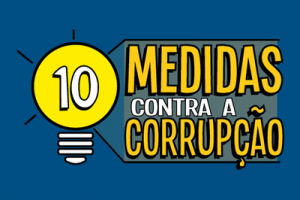FCPAméricas Blog
Ten Measures Proposed by the Brazilian Federal Prosecution Service to Fight Corruption (Part I)
4.26.2016
 The Brazilian Federal Prosecution Service launched a campaign last year to close ranks on corruption, proposing ten measures. The initiative is known as 10 Measures Against Corruption and, as of March 25, 2016, it had obtained 2,028,263 petitions from supporters around the country. On March 30th, it was delivered to Congress as a bill of law by popular initiative and will now follow the legislative process. Below is a summary of 5 measures proposed in the bill. The remaining five will be summarized in the next post.
The Brazilian Federal Prosecution Service launched a campaign last year to close ranks on corruption, proposing ten measures. The initiative is known as 10 Measures Against Corruption and, as of March 25, 2016, it had obtained 2,028,263 petitions from supporters around the country. On March 30th, it was delivered to Congress as a bill of law by popular initiative and will now follow the legislative process. Below is a summary of 5 measures proposed in the bill. The remaining five will be summarized in the next post.
1) Corruption prevention, transparency and whistleblower protection. The first measure sets forth that between 10 and 20% of the government marketing funds should be used in campaigns against corruption and to increase awareness of the social and individual impacts of corruption. Moreover, it requires training of public employees on procedures against corruption and the creation of a code of ethics detailing different ways in which corruption can take place. Furthermore, in order to stimulate complaints, the measure also provides for the confidentiality of a whistleblower that triggers an investigation (there have been court decisions in Brazil holding that an investigation cannot be triggered by an anonymous whistleblower).
2) Criminalization of illicit enrichment of public officials. The second measure criminalizes, with 3 to 8 years of incarceration and confiscation of assets, situations in which the public employee has funds or assets that are not compatible with his or her income as public employee or other licit sources. This measure seeks to ensure that the public official does not escape liability when it is not possible to prove that specific acts of corruption were committed by the official. The idea is that, in situations where it is not possible to prove the crime of corruption, the fact that the public official acquired considerable wealth, absolutely incompatible with his or her income and not supported by reasonable licit sources, can lead to accountability.
3) Increased sanctions for corruption cases. The crime of corruption in Brazil is currently punished with 2 to 12 years of incarceration plus fine. The third measure increases the minimum penalty to 4 years of incarceration plus fine. Further, depending on the amount of bribes paid or losses suffered by the public administration, the sanctions would be increased substantially, reaching up to 12 to 25 years of incarceration and fines.
4) Increase efficiency and justice of appeals in the criminal cases. The fourth measure seeks changes in criminal proceedings. According to the Federal Prosecution Service, “it is common for cases involving white-collar crimes to take longer than 15 years in the appellate courts” and in some cases “defense attorneys used delaying strategies – successive motions for stays and other objections”. The proposed measures seek to change criminal proceedings to speed up the process. Among other things, it sets forth the possibility of immediate execution of the sentence when the Court recognizes the abusive exercise of the right to appeal or when a verdict has been upheld on merit at the Court of Appeals, even if appeals are pending before the Superior Court of Justice and Supreme Court (the Supreme Court recently authorized the incarceration of the individual once the Court of Appeals confirms the conviction, even if appeals to superior courts are pending).
5) Celerity in Improbity cases. The Improbity Law (8.429/92) establishes sanctions to public agents for acts of administrative improbity (e.g., fraud or improper waiver of public tender and other similar situations). Although primarily directed to public agents, private companies and individuals might also be subjected to such law. Main sanctions include fines, debarment, and prohibition from receiving tax benefits. The fifth measure sets forth new procedural rules to speed up such proceedings and also requires the creation of specialized courts for this kind of proceeding.
The opinions expressed in this post are those of the author in his or her individual capacity, and do not necessarily represent the views of anyone else, including the entities with which the author is affiliated, the author`s employers, other contributors, FCPAméricas, or its advertisers. The information in the FCPAméricas blog is intended for public discussion and educational purposes only. It is not intended to provide legal advice to its readers and does not create an attorney-client relationship. It does not seek to describe or convey the quality of legal services. FCPAméricas encourages readers to seek qualified legal counsel regarding anti-corruption laws or any other legal issue. FCPAméricas gives permission to link, post, distribute, or reference this article for any lawful purpose, provided attribution is made to the author and to FCPAméricas LLC.
© 2016 FCPAméricas, LLC
Post authored by Carlos Henrique da Silva Ayres, FCPAméricas Contributor



 Comments
Comments